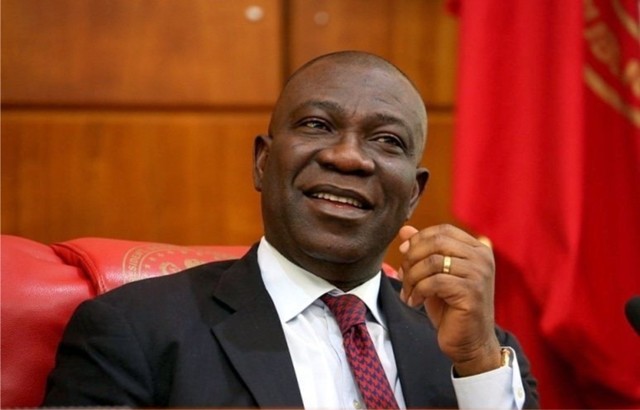Editorial
Lessons From Ekweremadu’s Conviction

David Nwamini’s organ trafficking plot case against former Deputy Senate President, Ike Ekweremadu; his wife, Beatrice, and Obinna Obeta, a medical doctor in the United Kingdom, has been decided. The case ended with the trio being sentenced by Justice Jeremy Johnson at Old Bailey Court in London on May 5.
In June 2022, the UK Metropolitan Police arrested Ekweremadu, his wife, and the medical doctor. They were accused of persuading doctors at the Royal Free Hospital to perform an £80,000 transplant on Nwamini. Nwamini was presented as a cousin of Ekweremadu’s daughter, Sonia. Despite their social status, they were remanded in custody after their arraignment and denied bail by the Uxbridge Magistrate’s Court.
Ekweremadu, aged 60, was sentenced to nine years and eight months. He was found guilty of arranging the travel of the Lagos street trader to exploit him for organ harvesting. His wife will serve four years and a fraction of months, while Obeta was sentenced to 10 years in jail. Ike and his wife’s prison terms run concurrently. The convicts were charged with human trafficking under sections 2 (1) (2) (3) (4) and 5 (2) of the Modern Slavery Act 2015 of the United Kingdom.
The Act clearly states that arranging or facilitating travel for organ harvesting with the intention of exploitation is a punishable offence. It applies to all victims, regardless of age or consent. Specifically, section 5 (2) provides that a person guilty of an offence under section 2 (4) is liable “on conviction or indictment, to imprisonment for a term not exceeding 10 years.”
The jury found that the convicts conspired to bring Nwamini to London to illegally harvest his kidneys. This is the first verdict under the Modern Slavery Act of 2015. It is unfortunate that the politician suffered such a tragic fate. The conviction notwithstanding, the legislator and his wife’s mission to seek a potential kidney donor to save their daughter could be rationalised on purely parental, affectionate, and charitable grounds.
The Senator and his wife have been eliciting sympathy from the public. However, as a senior lawyer and lawmaker, Ike Ekweremadu should have known the value of adhering to the rule of law. He should have sought advice from his lawyers in Nigeria regarding the strict liability associated with human trafficking in the UK. This was before travelling to London. This would have allowed him to avoid any potential legal issues and ensured that he acted within the law.
The lack of transparency and honesty in communication played a central role in the proceedings and eventual conviction. The former Deputy Senate President, instead of acting charitably, exercised an ‘entitlement mentality’, which led to the unfortunate situation for him, his wife, and Obeta. This behaviour is typical of Nigerian ‘big men’.
Their conviction should teach all Nigerians a few lessons. The prevailing mentality in Nigeria is that anything is possible, so what happened to them could happen to anyone. This is a reminder that Nigerians take shortcuts to achieve their personal goals without considering the consequences. It is necessary to reflect on the aftermath of our actions and avoid cutting corners in our pursuit of objectives.
Another lesson is that the rule of law is an essential principle that should always be upheld, regardless of who is involved. This means that everyone, irrespective of their social or economic status, should be treated equally before the law. In Nigeria, however, this doctrine is generally not promoted, with trials dragging on for extended periods and offenders repeatedly being left unpunished. The rule of law must be respected and enforced to ensure justice for all.
Nigerian government must protect judges in the country from their current vulnerable positions and potential danger. Their profession demands morality, independence, impartiality, and incorruptibility. They must always act with integrity, especially when making decisions in cases. To ensure this, the State must provide a favourable environment for their work.
Senator Ekweremadu’s predicament should prompt the quick improvement of Nigeria’s healthcare facilities. With well-equipped hospitals and medical experts, wealthy Nigerians may not need to travel abroad for medical services. Regrettably, the primary healthcare system for preventable diseases like polio, cholera, and measles is virtually non-existent in the country.
Shamefully, Nigeria currently has the highest number of people without access to basic primary healthcare. This results in a reduced life expectancy of 45 years. This is compounded by the fact that many medical professionals are leaving the country to practice medicine abroad, where they receive better pay and recognition.
It is heartrending that the fate of the Ekweremadus has come to this. However, Nigerians often break laws and circumvent procedures with impunity. While it is heartening to see some Nigerians pleading for clemency for the Senator and his cohorts, we must acknowledge that they seriously breached the law. They must face the consequences. This conviction further serves as a lesson in integrity and the significance of lawful and transparent business practices.
Editorial
Resolve Rumuwoji Market Issues, Others

Editorial
As NDG Ends Season 2

Editorial
Beginning A New Dawn At RSNC

-

 Politics3 days ago
Politics3 days agoSenate Urges Tinubu To Sack CAC Boss
-

 News3 days ago
News3 days agoAmend Constitution To Accommodate State Police, Tinubu Tells Senators
-

 News3 days ago
News3 days agoDisu Takes Over As New IGP …Declares Total War On Corruption, Impunity
-
Business3 days ago
President Tinubu Extends Raw Shea Nuts Export Ban To 2027
-
Business3 days ago
Crisis Response: EU-project Delivers New Vet. Clinic To Katsina Govt.
-
Sports3 days ago
NDG: Rivers Coach Appeal To NDDC In Talent Discovery
-
Business3 days ago
President Tinubu Approves Extension Ban On Raw Shea Nut Export
-
Rivers3 days ago
Etche Clan Urges Govt On Chieftaincy Recognition

